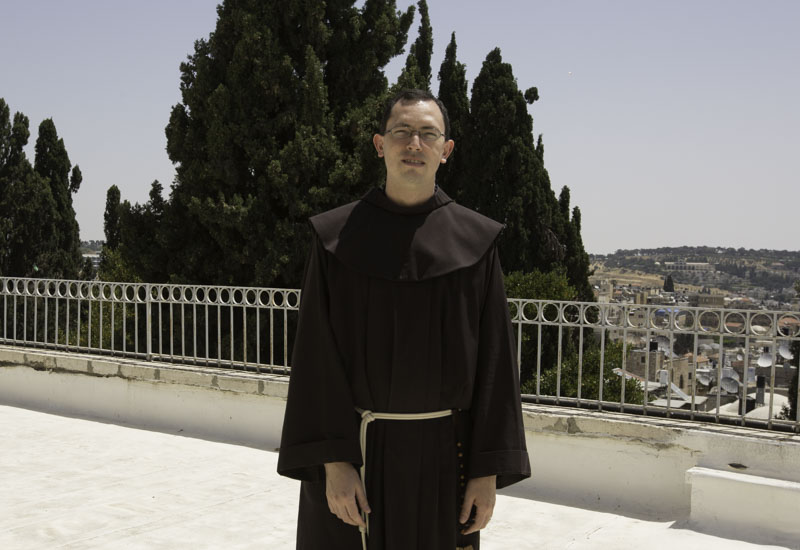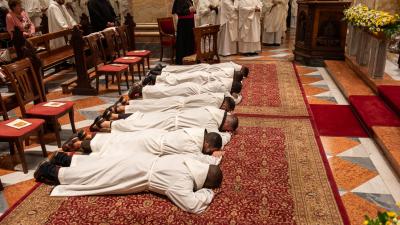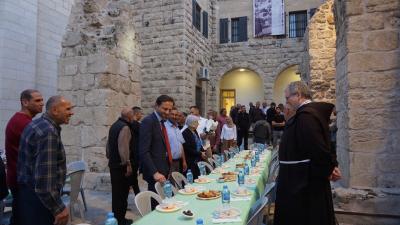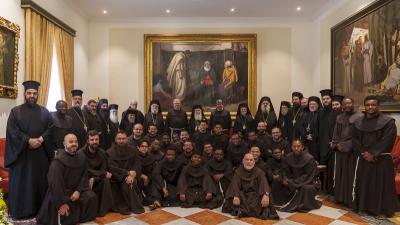
800 years have passed since the friars arrived in the Middle East, and many things have changed since the beginning of this adventure. However, the commitment and dedication with which, for 800 years, the friars have guarded the holy places and have worked to serve the local people have not changed. For this reason, in order to understand what the Custody of the Holy Land is today, we must begin with them and their stories: they come from all over the world and from different countries and each of them has a specific mission.
Fr. Rodrigo Machado Soarez, class of 1986, is completing his theology studies and serves the Custody as an assistant to the master of ceremonies for [various] celebrations. Originally from Brazil, will be ordained a priest in his home country at the end of August.
Let’s start from the beginning. How did you decide to become a friar?
It sounds weird to say it, but I became a friar because of a theater production. Ten years ago I already had the vocation, I was an altar boy and my family was Catholic but not practicing. My aunt, on the other hand, was very practicing, and took me to catechism and to church.
One day we decided to re-organize our little chapel and found a statue of a man dressed in brown, with wounds and a hood. I found it so beautiful that I wanted to keep it. My aunt explained to me that it was St. Francis and that I could pray to him and that he would help me.
At 12 years old, I already had felt the vocation but I refused to go to the meetings when I saw priests being sent to the Philippines: I did not want to go far away from my home and my mother.
While I was in school, then, I always did theater: it was a world that fascinated me. I followed a tailoring course in a social center and one day a priest asked me to stage a show for Christmas. I went to my aunt, who reminded me of the story of St. Francis. I needed a habit for the theater and a friend told me about the Franciscans who lived close to home. I went there and their simple way of being struck me a lot. The friar understood it and gave me some writings on St. Francis. I read everything and, in the end, I said that I also wanted to be like them.
What was your vocation journey like up to the time when you became a friar?
I got in touch with the province’s vocations director, but my dad was against this decision. I insisted, and the vocations director also talked to him, but there was nothing to do. I had decided to go there because it was my vocation: God called me. In the end, after talking with the priest, he accepted [it].
My training process started in Brazil, in the province of San Francisco. I spent three years as a candidate, one year as a postulant, three years doing philosophy studies, one year doing pastoral theology, where I was introduced to a parish, and then I made my solemn profession. Afterwards, I came to the Holy Land to study theology. I longed to come to the Holy Land, but at the beginning my superior asked me to continue studying in Brazil. Now I’m here, and I’ve already completed three years and I assist the master of ceremonies.
How did you learn about the Custody of the Holy Land? Because the vocations director came to Brazil for a conference. After this event, there was a fire inside of me, a desire to come to the Holy Land. My love for the Holy Land is tied to the liturgy.
What is your mission at the Custody?
I assist the master of ceremonies, and I also work with cultural heritage and I am in charge of the sacristy. I have also been helped at the shrines, and I have had experience as a tour guide, assisting pilgrims, without losing the initial call, that is, love for the holy places that brought Francis and all of the friars here. Now I will study theology for another year. My life is split between school and liturgy. It is a custom of the Custody that two students assist the custodial master of ceremonies and this is what I do. I have to choose readers, people for the offertory, etc. Participation of the local community and pilgrims is emphasized. So, it [can be] difficult. But the mystery is celebrated from up close.
What are the obstacles that you are facing today in your journey as a friar?
The first difficulty in the Holy Land is realizing that you are not in your own country, with your own culture. The mentality is different. I come from a very secularized reality and faith. Instead, coming here, I have found a world “full of religions,” where you are marked with your religion from birth.
The second difficulty is the language [barrier]. I left Brazil without knowing another language. Now, I speak Italian and next year, I will start learning English, but I feel the lack of knowledge of the local language. For example, I bring the Eucharist to the sick, accompanied by the Sisters of Charity. The [sick] person awaits you and wants to hear a word, but you have to force yourself into ritual because you do not speak the language. There, I see the beauty of an encounter: it is another experience compared to that of the sanctuaries. People are waiting for your presence and, through you, Jesus’.
Has living in the Holy Land changed the way you relate to religion?
Yes. Here I had a monastic life during my formation, with a straightforward prayer structure. Then the Holy Sites are those of the Gospel. One thing is reading “The Word was made flesh” where I was born. Another thing is reading “Verbum carum factum est” in the grotto of the Annunciation on March 25. This completely changes your relationship with religion.
Do you have a message for a young men undergoing vocational discernment? Vocation is a stage of discovery. They should pay attention to the questions and the answers because vocation is revealed [in them]. When I see Francis looking at the cross and asking “Lord, what do I have to do?” and the cross answers “Go and rebuild my house that is in ruins,” I see a vocational message that is followed by the question “Why me?” This is the question that everyone should ask themselves: why me? If I look at my life, it was a very strong question. I read the story of St. Francis and I heard that there was something that was awakening inside me that spoke to me. It is like love: you know you're in love when you hear a romantic story and it makes sense in your life.
N.S. – B.G.




